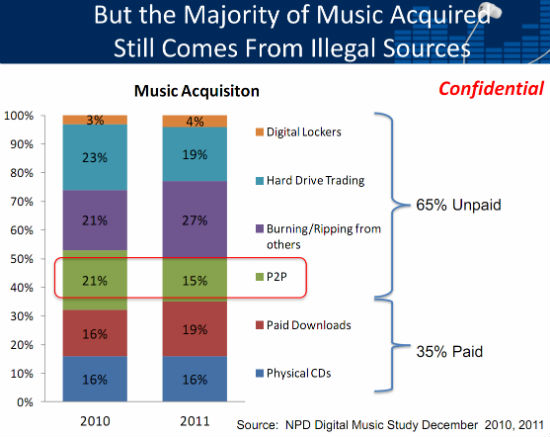Monthly Archives: July 2012
Abstruse Goose ?? The Beneficence of Others
What Judge Harvey said
Blendr Isn’t Grindr: Why We Still Don’t Have a Straight Hookup App
In other words, the only way to make a straight version of Grindr work is to make it woman-centric. Given the gender gap in the tech-startup world right now, I’m guessing I have a long while to wait for such an app.
In an environment that allows “permissionless innovation” it only takes one, so I doubt any wait will be the result of a “gender gap” in the tech-startup world.
Diller and Aereo win first round: injunction denied
Aereo, a bold bid to transmit television via broadband using tiny off-site antennas, won a major victory in federal court Wednesday when a judge denied the plaintiffs??? demand for a preliminary injunction blocking the service from allowing timeshifting during a live broadcast. The judge found that Aereo???s method of enabling individuals to control viewing and recording from their PCs or mobile devices was covered by an earlier appellate decision.
Oh noes! Free to air appointment television teeters on the brink.
SOPA, Meet The Player Piano Copyright Threat
Consider the player piano. When it arrived on the scene in the late 19th century, music publishers were horrified by this new machine that allowed anybody to recreate the performance of a great pianist inside their own home without paying a dime in royalties. By 1906 there were 75,000 player pianos clinking out copyright violations all across this country, using millions of perforated paper rolls that contained, in many cases, note-for-note transcriptions of famous performances.
The music publishers sued and in 1908 the U.S. Supreme Court decided, in White-Smith Publishing v. Apollo, that the player-piano roll was a mere mechanical device, not an unauthorized copy of sheet music. Put a player piano inside a saloon or a performance hall and you???d be liable for performance royalties. But inside the home, the court decided, it was just another type of music box. Justice Oliver Wendell Holmes, in a prescient side note, said Congress needed to update the laws, because ???on principle anything that mechanically reproduces that collocation of sounds ought to be held a copy.??? And indeed, the next year Congress passed a special tax of 2 cents per player-piano roll to help defray the enormous cost to content providers of unauthorized performances in the home. As of 1996 the rate had risen to 6.95 cents.
Plus ??a change plus c’est la m??me chose
VICTORY! ACTA Suffers Final, Humiliating Defeat In European Parliament – Falkvinge on Infopolicy
Today at 12:56, the European Parliament decided whether ACTA would be ultimately rejected or whether it would drag on into uncertainty. In a crushing 478-to-39 vote, the Parliament decided to reject ACTA once and for all. This means that the deceptive treaty is now dead globally.
This is a day of celebration. This is the day when citizens of Europe and the world won over unelected bureaucrats who were being wooed and lobbied by the richest corporations of the planet. The battleground wasn???t some administrative office, but the representatives of the people ??? the European Parliament ??? which decided in the end to do its job beautifully, and represent the people against special interests.
A time for celebration, and preparation for TPPA
What???s at Stake in the San Diego Round of the Trans Pacific Partnership Agreement (TPP)
TEMPORARY COPIES: TPP Art. 4.1 proposes to extend the minimum requirements of the right to reproduction for all protected works to include the right to exclude ???temporary storage in electronic form.??? The WIPO Performances and Phonograms Treaty extends the right of reproduction for performers and producers of phonograms to ???any manner or form.??? But proposals to include a specific right to block temporary reproduction in electronic form were considered and rejected in the negotiation.[4]
The language in TPP Art. 4.1, although included in some other US Free trade agreements, is not a full expression of U.S. law on the topic. Section 106(1) of the Copyright Act does not contain language prohibiting reproduction ???in any form.??? It rather prohibits reproduction of the ???copyrighted works in copies or phonorecords.???[5] Nor does U.S. law include an extension to ???temporary storage in electronic form.??? U.S. law requires that an infringing copy be ???fixed,??? meaning ???sufficiently permanent or stable to permit it to be perceived, reproduced, or otherwise communicated for a period of more than transitory duration.???[6] Likewise, the Digital Millennium Copyright Act [hereinafter DMCA] recognizes a safe harbor for ???system caching.???[7]
The distinctions are particularly important for enforcement of copyright on the internet. Lower courts in the U.S. have, for example, held that copyright does not extend to buffer copies on the internet.[8] Similarly, although not a party to this agreement, the EU Copyright Directive (Directive 2001/29/EC, Article 5) contains an explicit exception for temporary reproductions addressing automated caching.[9]
Preposterous. First it’s a property, then it’s emphemeral. Whatever makes the most money.
This “ephemeral” right is all about the collecting agencies having a club to beat blanket licences out of ISPs and, well, anyone with a router and money I guess.
Sleazy. And typical. If there’s value, there’s rights.


